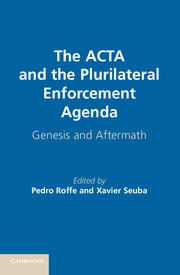Book contents
- Frontmatter
- Contents
- List of Contributors
- Foreword
- Acknowledgments
- Acronyms
- Introduction
- PART I THE FINAL ACT: ITS MAIN FEATURES AND CONTENTS
- PART II DOMESTIC LEGISLATIVE CHALLENGES
- PART III IMPACT ON RELATED PROCESSES
- PART IV VIEWS FROM STAKEHOLDERS: LESSONS
- 17 Lessons Learned from the ACTA Process
- 18 Lessons Learned from the ACTA Process
- 19 ACTA, a View from the Eye of the Storm
- 20 ACTA, the EU, and Economic, Social, and Cultural Rights in the Digital Environment
- PART V WHAT LIES AHEAD ACTA
- Annex I Anti-Counterfeiting Trade Agreement
- References
- Index
17 - Lessons Learned from the ACTA Process
An Industry Perspective
Published online by Cambridge University Press: 05 December 2014
- Frontmatter
- Contents
- List of Contributors
- Foreword
- Acknowledgments
- Acronyms
- Introduction
- PART I THE FINAL ACT: ITS MAIN FEATURES AND CONTENTS
- PART II DOMESTIC LEGISLATIVE CHALLENGES
- PART III IMPACT ON RELATED PROCESSES
- PART IV VIEWS FROM STAKEHOLDERS: LESSONS
- 17 Lessons Learned from the ACTA Process
- 18 Lessons Learned from the ACTA Process
- 19 ACTA, a View from the Eye of the Storm
- 20 ACTA, the EU, and Economic, Social, and Cultural Rights in the Digital Environment
- PART V WHAT LIES AHEAD ACTA
- Annex I Anti-Counterfeiting Trade Agreement
- References
- Index
Summary
Introduction
After decades of exponential growth in trademark counterfeiting and copyright piracy, ten countries and the twenty-seven member states of the European Union announced in June 2008 the launch of negotiations for the Anti-Counterfeiting Trade Agreement (ACTA). Following traditional trade negotiation protocols, the negotiators of ACTA released an agreement on May 2011 aimed at tackling counterfeiting and piracy at a global level.
Fourteen months later, the European Parliament voted not to approve ACTA, effectively blocking any further progress of the agreement in the EU. Although subsequently there was positive news for ACTA with Mexico signing it in July 2012 and Japan ratifying the agreement in September 2012, industry supporters knew that ACTA’s progress faced an uphill challenge in getting additional signatories and actual implementation. What clearly emerged after a four-year effort to support the trade agreement was that the perceived impact of ACTA on the Internet had become one of the most controversial issues facing policy makers, enforcement officials and industry battling to protect businesses and consumers exposed to fraud and theft online. Without a doubt, efforts will need to be redoubled to increase public awareness of the value of intellectual property (IP) and the harms of IP infringement, particularly on the Internet.
- Type
- Chapter
- Information
- The ACTA and the Plurilateral Enforcement AgendaGenesis and Aftermath, pp. 273 - 280Publisher: Cambridge University PressPrint publication year: 2014



